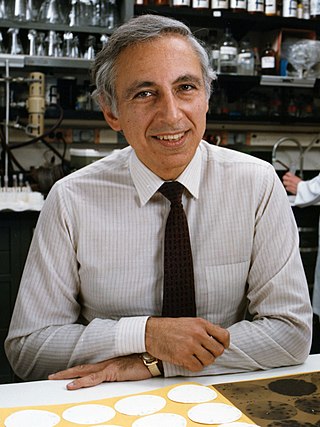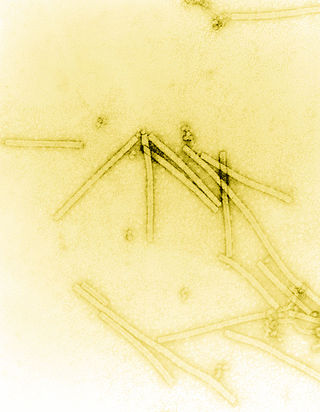Related Research Articles

Human T-cell lymphotropic virus type 1 or human T-lymphotropic virus (HTLV-I), also called the adult T-cell lymphoma virus type 1, is a retrovirus of the human T-lymphotropic virus (HTLV) family that has been implicated in several kinds of diseases including very aggressive adult T-cell lymphoma (ATL), HTLV-I-associated myelopathy, uveitis, Strongyloides stercoralis hyper-infection and some other diseases. It is thought that about 1–5% of infected persons develop cancer as a result of the infection with HTLV-I over their lifetimes.
Viral pathogenesis is the study of the process and mechanisms by which viruses cause diseases in their target hosts, often at the cellular or molecular level. It is a specialized field of study in virology.

Tropical spastic paraparesis (TSP), is a medical condition that causes weakness, muscle spasms, and sensory disturbance by human T-lymphotropic virus resulting in paraparesis, weakness of the legs. As the name suggests, it is most common in tropical regions, including the Caribbean. Blood transfusion products are screened for human T-lymphotropic virus 1 (HTLV-1) antibodies, as a preventive measure.

Robert Charles Gallo is an American biomedical researcher. He is best known for his role in establishing the human immunodeficiency virus (HIV) as the infectious agent responsible for acquired immune deficiency syndrome (AIDS) and in the development of the HIV blood test, and he has been a major contributor to subsequent HIV research.

The history of virology – the scientific study of viruses and the infections they cause – began in the closing years of the 19th century. Although Louis Pasteur and Edward Jenner developed the first vaccines to protect against viral infections, they did not know that viruses existed. The first evidence of the existence of viruses came from experiments with filters that had pores small enough to retain bacteria. In 1892, Dmitri Ivanovsky used one of these filters to show that sap from a diseased tobacco plant remained infectious to healthy tobacco plants despite having been filtered. Martinus Beijerinck called the filtered, infectious substance a "virus" and this discovery is considered to be the beginning of virology.

The primate T-lymphotropic viruses (PTLVs) are a group of retroviruses that infect primates, using their lymphocytes to reproduce. The ones that infect humans are known as human T-lymphotropic virus (HTLV), and the ones that infect Old World monkeys are called simian T-lymphotropic viruses (STLVs). PTLVs are named for their ability to cause adult T-cell leukemia/lymphoma, but in the case of HTLV-1 it can also cause a demyelinating disease called tropical spastic paraparesis. On the other hand, newer PTLVs are simply placed into the group by similarity and their connection to human disease remains unclear.

A virus closely related to HTLV-I, human T-lymphotropic virus 2 (HTLV-II) shares approximately 70% genomic homology with HTLV-I. It was discovered by Robert Gallo and colleagues.

Janice Ellen Clements is vice dean for faculty at the Johns Hopkins School of Medicine and the Mary Wallace Stanton Professor of Faculty Affairs. She is a professor in the departments of Molecular and Comparative Pathobiology, Neurology, and Pathology, and has a joint appointment in molecular biology and genetics. Her molecular biology and virology research examines lentiviruses and how they cause neurological diseases.

William A. Haseltine is an American scientist, businessman, author, and philanthropist. He is known for his groundbreaking work on HIV/AIDS and the human genome.
Alexander F. Voevodin M.D., Ph.D., D.Sc., FRCPath is Russian-born biomedical scientist and educator. He is considered one of the leading early pioneers of HIV/AIDS research.
William "Bill" Fleming Hoggan Jarrett, RCVS, FRCPath, FRCPG, FRS (1928–2011) was a British pathologist.
Bernard Moss is a virologist at the National Institute of Allergy and Infectious Diseases, part of the United States National Institutes of Health. He is the Chief of the NIAID Laboratory of Viral Diseases and of the NIAID Genetic Engineering Section. He is known for his work on poxviruses.
Éric A. Cohen is a Canadian molecular virologist whose research is focused on human immunodeficiency virus (HIV)-host interactions that govern viral replication and persistence.

The Global Virus Network (GVN) is an international coalition of medical virologists whose goal is to help the international medical community by improving the detection and management of viral diseases. The network was founded in 2011 by Robert Gallo in collaboration with William Hall and Reinhard Kurth, and 24 countries were members of the network as of 2015. The GVN fosters research into viruses that cause human disease to promote the development of diagnostics, antiviral drugs and vaccines, and its mission includes strengthening scientific training and response mechanisms to viral outbreaks. The GVN has organized task forces for chikungunya, human T-lymphotropic virus, and Zika. The network is headquartered at the Institute of Human Virology at the University of Maryland School of Medicine, and Gallo serves as its scientific director.
Igor Koralnik is an American physician, neurologist and scientist. He is one of the first physicians to study the neurologic complications caused by the human immunodeficiency virus (HIV) and is a leading researcher in the investigation of the polyomavirus JC, which causes progressive multifocal leukoencephalopathy (PML), a disease of the central nervous system that occurs in immunosuppressed individuals.
Guan Yi is a Chinese virologist. In 2014, he was ranked as 11th in the world by Thomson Reuters among global researchers in the field of microbiology. He obtained his PhD in microbiology at the University of Hong Kong and is now a professor of microbiology at his alma mater. His research on the viral respiratory disease SARS helped the Chinese government avert the 2004 outbreak of this disease. He is the current director of the State Key Laboratory for Emerging Infectious Diseases University of Hong Kong. In early 2017, Guan warned that the H7N9 influenza virus "poses the greatest threat to humanity than any other in the past 100 years".
William Paul Duprex is a British scientist and advocate for vaccines and global health. He serves as Director of the University of Pittsburgh's Center for Vaccine Research and Regional Biocontainment Laboratory. Duprex holds the Jonas Salk Chair in Vaccine Research. He is also a professor of microbiology and molecular genetics at the University of Pittsburgh School of Medicine and serves as Editor-in-Chief of the Journal of General Virology, which is published by the Microbiology Society, and a senior editor of mSphere, published by the American Society for Microbiology. Duprex is an expert in measles and mumps viruses and studies viral spillover from animals to humans, including the SARS-CoV-2 virus that caused the COVID-19 pandemic. Duprex is a Fellow of the American Academy of Microbiology.
References
- ↑ "About – GVN". gvn.org. Retrieved 5 March 2020.
- 1 2 3 "William W. "Billy" Hall | Atlantic Philanthropies". The Atlantic Philanthropies. Retrieved 5 March 2020.
- 1 2 3 "Prof. William Hall". HSTalks. Retrieved 5 March 2020.
- ↑ https://www.atlanticphilanthropies.org/about/bios/william-w-billy-hall
- ↑ "Centre for Research in Infectious Diseases". UCD School of Medicine & Medical Science. Retrieved 5 March 2020.
- ↑ Baxter, Johnny (20 February 2017). "President of Ireland Michael D. Higgins visits UCD infectious disease facility in Cuba". University College Dublin. Retrieved 20 August 2021.
- ↑ Murphy, Jane; Hall, William W.; Ratner, Lee; Sheehy, Noreen (July 2016). "Novel interactions between the HTLV antisense proteins HBZ and APH-2 and the NFAR protein family: Implications for the HTLV lifecycles". Virology. 494: 129–142. doi:10.1016/j.virol.2016.04.012. ISSN 0042-6822. PMC 4924524 . PMID 27110706.
- ↑ Hall, William W. (April 1999). "Human T Lymphotropic Virus Type Ii (HTLV-Ii): Molecular Properties and Clinical and Immunological Features of Infection". Journal of Acquired Immune Deficiency Syndromes and Human Retrovirology. 20 (4): A7. doi:10.1097/00042560-199904010-00021. ISSN 1077-9450.
- ↑ Chandran, Cynthia (10 February 2019). "Afforestation brought new virus in Kerala". Deccan Chronicle. Retrieved 5 March 2020.
- ↑ "WORLD EXPERTS IN VIROLOGY ALERT THAT CLIMATE CHANGE AND GLOBALIZATION ARE AN ADDED PROBLEM IN VIRAL DISEASE TRANSMISSION – GVN". gvn.org. Retrieved 5 March 2020.